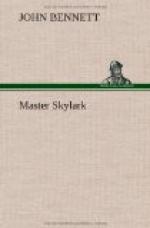The viol and the music came again from overhead, and when they ceased Nick sang the little song once more. And when the master-player had taken him outside, and the play was over, some fine ladies came and kissed him, to his great confusion; for no one but his mother or his kin had ever done so before, and these had much perfume about them, musk and rose-attar, so that they smelled like rose-mallows in July. The players of the Lord Admiral’s company were going about shaking hands with Carew and with each other as if they had not met for years, and slapping one another upon the back; and one came over, a tall, solemn, black-haired man, he who had written the song, and stood with his feet apart and stared at Nick, but spoke never a word, which Nick thought was very singular. But as he turned away he said, with a world of pity in his voice, “And I have writ two hundred plays, yet never saw thy like. Lad, lad, thou art a jewel in a wild swine’s snout!” which Nick did not understand at all; nor why Master Carew said so sharply, “Come, Heywood, hold thy blabbing tongue; we are all in the same sty.”
“Speak for thyself, Gat Carew!” answered Master Heywood, firmly. “I’ll have no hand in this affair, I tell thee once for all!”
Master Carew flushed queerly and bit his lip, and, turning hastily away, took Nick to walk about the town. Nick then, for the first time, looked into his hand to see what the man upon the stage had given him. It was a gold rose-noble.
CHAPTER X
AFTER THE PLAY
Through the high streets of the third city of the realm Master Gaston Carew strode as if he were a very king, and Coventry his kingdom.
There was music everywhere,—of pipers and fiddlers, drums, tabrets, flutes, and horns,—and there were dancing bears upon the corners, with minstrels, jugglers, chapmen crying their singsong wares, and such a mighty hurly-burly as Nick had never seen before. And wherever there was a wonder to be seen, Carew had Nick see it, though it cost a penny a peep, and lifted him to watch the fencing and quarter-staff play in the market-place. And at one of the gay booths he bought gilt ginger-nuts and caraway cakes with currants on the top, and gave them all to Nick, who thanked him kindly, but said, if Master Carew pleased, he’d rather have his supper, for he was very hungry.
“Why, to be sure,” said Carew, and tossed a silver penny for a scramble to the crowd; “thou shalt have the finest supper in the town.”
Whereupon, bowing to all the great folk they met, and being bowed to most politely in return, they came to the Three Tuns.
Stared at by a hundred curious eyes, made way for everywhere, and followed by wondering exclamations of envy, it was little wonder that Nick, a simple country lad, at last began to think that there was not in all the world another gentleman so grand as Master Gaston Carew, and also to have a pleasant notion that Nicholas Attwood was no bad fellow himself.




